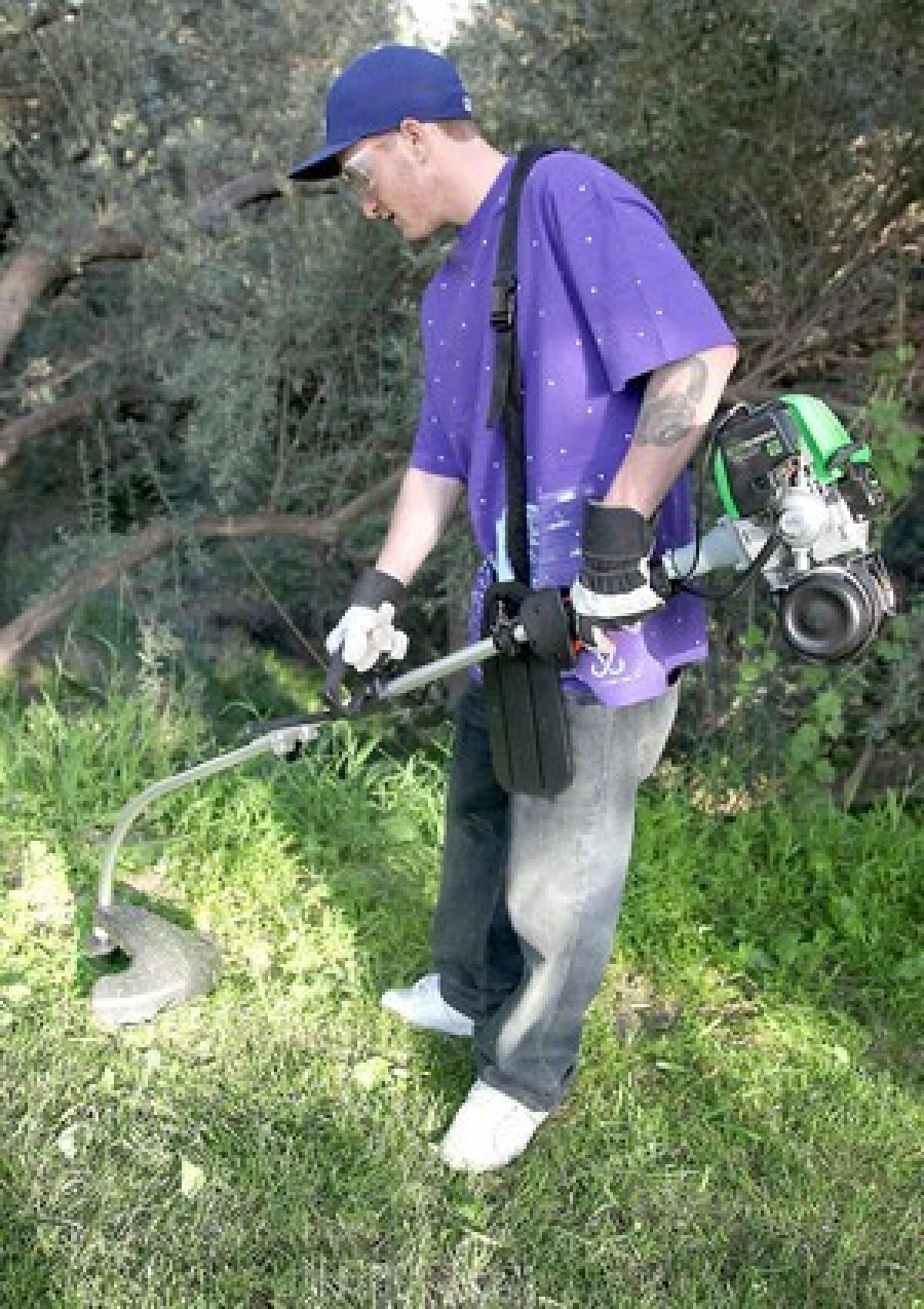Yard work cleaned up

The filthiest, most polluting, most awful thing in your home is not your kid’s hard drive. It’s your lawn and garden equipment, which is, even as you read this, outgassing carcinogens into the atmosphere as a result of a charming process called “evaporative emissions.” Millions of these atmospheric cesspools are stewing away in garages and tool sheds across the state, venting volatile organic compounds into California’s already troubled skies. And that’s before you even pull the string to start them. Ick.
The worst polluters are hand-held devices powered by small, howling two-stroke engines -- like leaf blowers and string trimmers -- that spew clouds of unburned hydrocarbons (gas and oil), nitrogen oxides, particulates and carbon monoxide. They are like roach bombs for humans.
Compared to the typical two-stroke weed whacker, the propane-powered Lehr Eco Trimmer exhausts angel’s breath. Because it uses a 1-pound liquid propane gas canister -- like the ones you might use in a camp stove or lantern -- the device has no evaporative emissions. And because you don’t have to slop gasoline and oil into a fuel tank, you can avoid adding to the estimated 17 million gallons of gasoline spilled onto driveways and lawns every year (the sardines in the bay will thank you). Lehr uses a twist cap connector for the canister. You simply slide the canister into the strap holders, screw on the connector and voila, you are Hank, the master of propane from “King of the Hill.”
Lehr is an interesting company. Founded by Bernardo J. Herzer -- who rather quaintly retains the title “Captain” from his days as the master of ocean research vessels -- the Los Angeles-based firm is the first to offer a lawn and garden power appliance using the 1-pound LPG canister as a fuel cell. While captaining ships, Herzer developed a knack for converting conventional four-stroke gasoline engines to use propane (it involves changing the valve timing and compression ratio, if that helps).
The Eco Trimmer weed whackers -- one-piece or two-piece shaft, curved or straight -- are available at Ace Hardware and other retail outlets and start at $199, a price comparable to most trimmers of similar power and size. Sears offers a Craftsman-branded version.
Lehr plans to expand to include a leaf-blower (available this fall) and a lawn mower. As a point of comparison, a typical 5-hp gasoline-powered lawn mower produces more pollution in an hour than a Prius does in 800 miles of driving, according to California Air Resources Board figures.
The Lehr Eco Trimmer seems to resolve a nagging irony for garden enthusiasts: Namely, that in the process of manicuring their little corners of paradise, they spew poison into it.
Last year the Environmental Protection Agency released new emissions standards for gas-powered lawn equipment, which will fully come into force in 2011. The Lehr string trimmer is 64% cleaner than these higher standards.
Since I don’t have a yard, per se, I was obliged to borrow my fellow columnist Chris Erskine’s lawn to test the Eco Trimmer. Thoughtfully, Erskine had allowed his lawn to become overgrown to Amazonian levels.
The machine I tested was the “detachable curved shaft” Eco Trimmer powered by a 25-cc four-stroke engine. With a full canister it weighs about 16 pounds and comes with a detachable shoulder strap and rather weird protective pad that situates itself at crotch level.Because it runs on propane gas, there’s no fuel bulb to squeeze in order to prime the engine. I pulled the string twice and the little beastie fired right up. It’s worth noting that, propane or not, a four-stroke string trimmer is considerably quieter than a two-stroke. If you value your hearing, the four-stroke is the way to go.
In all other respects, the Eco Trimmer is a conventional tool. It cuts a swath 17 inches in diameter and has a throttle trigger to vary the engine speed (RPM). It uses uses a “bump-feed” system to spool out more monofilament as string is used.
Lehr estimates that the 1-pound canister will provide about 2 hours of run time, which is longer than a gas-powered unit with a 1-pint fuel tank. However, a propane canister retails for about $3 or $4 and gas averages $2.34 a gallon in California this week, so it would seem that the operating costs of the Eco Trimmer are a bit higher.
In short order, the Erskines’ back yard was tidied up -- though, thanks to the torque-y little machine, I managed to amputate large branches of some jade plants hidden in the weeds. When I was done, I simply unscrewed the connector from the fuel tank and tossed the machine in the back of the minivan, no muss, no fuss, no spills.
I’ve sworn to myself that I’ll never buy another conventional gas-powered automobile. Thanks to Lehr, I can take the same pledge regarding garden equipment.
Neil’s past reviews of home technology and design can be found at www.latimes.com/majordomo.
Sign up for The Wild
We’ll help you find the best places to hike, bike and run, as well as the perfect silent spots for meditation and yoga.
You may occasionally receive promotional content from the Los Angeles Times.



